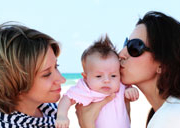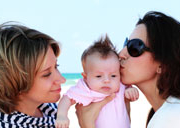Same sex parenting vs heterosexual parenting: research revisited
 A controversial study on gay parenting published this summer generated such an outcry of protest on its findings and ad hominen attacks on the author, that it led, among other things, to an official investigation into the ethics of the study and possible scientific misconduct (he was cleared).
A controversial study on gay parenting published this summer generated such an outcry of protest on its findings and ad hominen attacks on the author, that it led, among other things, to an official investigation into the ethics of the study and possible scientific misconduct (he was cleared).
The research, by Prof Regnerus, suggested that adult children who had been raised, for at least a brief time, in families with a gay, lesbian, or bisexual parent were more likely to report dysfunctional adult outcomes than those who had been raised in other family structures, especially families with continuously married heterosexual parents.
Unsurprisingly, these findings were neither universally welcomed nor popular.
However the journal that published the original paper, Social Science Research, has this month given its support to the methodology and thus research. One scholar says:
‘…criticisms of the underlying ethics and professionalism are misplaced because nearly every methodological decision that was made has ample precedents in research published by many other credible and distinguished scholars.’
In other words, the Regnerus research was found to have much in common with other research that is accepted without controversy. Investigations of similar issues have similar methodological limitations as this one, but their findings are accepted.
I wrote about this research back in June because its findings are important, and it clearly disturbed those who hold to the view that the children raised by same sex couples fare as well as (and in some cases, better than), those raised by heterosexual couples. It seems appropriate to set out some of my original comments on it again, now that it has generated more headlines:
What does the research find? And why the controversy over it?
Some reports in June suggested that the research ‘proves’ that gay parents are bad parents and that homosexual parenting is not equal to heterosexual marriage.
To put this study in context, the conventional wisdom that has been emerging from comparative studies of same-sex parenting is that there are very few differences in the child outcomes of gay and lesbian parents compared to heterosexual parents. Moreover, a number of possible advantages of having a lesbian couple as parents have emerged in recent, influential, studies, such as those by Susan Golombok in the UK.
The widely used American Psychological Association’s Brief on Lesbian and Gay Parenting states that:
‘Not a single study has found children of lesbian or gay parents to be disadvantaged in any significant respect relative to children of heterosexual parents.’
However Regenerus said, because of his research, that these claims are now void:
‘The empirical claim that no notable differences exist must go.’
For 25 of the 40 outcomes used, Regnerus reported that children whose mothers had a same-sex relationship were significantly different in young adulthood relative to those who spent their entire childhood in an intact family with their married, biological parents. Most of these differences persisted after statistical controls. This included far higher rates of sexual assault, poorer physical health, increased depression, increased marijuana use, smoking, higher levels of criminality and unemployment (69% of children from lesbian households were on welfare, compared to 17% of those with married parents).
When compared with other young adults who experienced household transitions and who witnessed parents forming new relationships (for example, stepfamilies) the children of lesbian mothers were statistically significantly different just under 25% of the time (and typically in negative ways). Since single-parent households are typically considered the most disadvantaged households, it is interesting that same-sex households are more disadvantaged than even this group in the NFSS.
Whether same-sex parenting causes the differences is, however, another matter. This is where caution is needed.
It is quite likely that the same-sex group in the study also experienced single-parenting at one time, and that experiencing multiple changes in family types may predict the poorest outcomes.
In other words, this study cannot isolate the effect of having a parent who had a same-sex relationship from the effect of experiencing multiple family forms.
Although some respondents lived in planned same-sex parent families (children born from donor insemination or adopted at birth by lesbian couples) most of the respondents who were included in the group of children of same-sex parents spent some portion of their childhood living in heterosexual and single-parent households as well as in same-sex unions. This therefore makes it very hard to isolate the effects of living with a same-sex parent from the effects of divorce, remarriage, or living with a single parent.
To elaborate further, a leading US family researcher said:
‘…most of the young adults with gay or lesbian parents in the NFSS also experienced divorce as children. Consequently, it is likely that many of the disadvantages reported by these offspring were due to marital disruptions that preceded (or coincided with) the time when their parents come out as gay or lesbian. In other words, these disadvantages may be due to the failed heterosexual marriages of parents rather than the sexual orientations of parents.’ (Amato 2012)
Regnerus is very clear about what he does and does not find:
‘I am thus not suggesting that growing up with a lesbian mother or gay father causes suboptimal outcomes because of the sexual orientation or sexual behavior of the parent; rather, my point is more modest: the groups display numerous, notable distinctions, especially when compared with young adults whose biological mother and father remain married.’
Does the research tell us anything else of interest and use?
It does, and it is important, although it is not the main thrust of his research.
Inadvertently, Regnerus draws attention to the failures of almost every other study on same-sex parenting in terms of their design and methodology, and he has demonstrated how difficult it is to find a large, random sample of this small population.
The context of this new study is a research literature spanning 50-plus studies done in the past 15 years which mostly come to the same conclusion: children of gay parents perform at least as well as children from heterosexual families and there is little difference in child outcomes based on family structure.
This new research comes up with different conclusions for two main reasons. As explained above, the quality of the sample and rigour of the analysis enables a more accurate picture to be drawn. The other side to this coin is that the previous research was generally poor and therefore less reliable.
Almost all the literature on gay parenting is based on weak designs, biased samples (eg. of high-income, highly educated, self-selected lesbian parents who are compared to random samples of opposite-sex parents), and low-powered tests. It has used ‘soft’ measures of child and family performance that are not easily verifiable by third-party replication.
Some highly respected studies only employ as few as 18, 33 or 44 cases of respondents with same-sex parents (including Golombok et al). It is hardly surprising that statistically significant differences would not emerge in these. Moreover, most studies of gay parenting processes have focused on the present, and what is going on inside the household when children are still under parental care, which reveals more about the current experience and perceptions of parents in households with children than it does about young adults who have experienced childhood and now speak for themselves. Regnerus says:
‘…one conclusion from the analyses herein is merited: the sample-selection bias problem in very many studies of gay and lesbian parenting is not incidental, but likely profound, rendering the ability of much past research to offer valid interpretations of average household experiences of children with a lesbian or gay parent suspect at best.’ (emphasis added).
The research is not just weak, it is limited:
‘To understand the implications of being raised from birth by two same-sex parents, researchers need to study children born through sperm donation or surrogacy. Yet we know relatively little about the newest generation of planned children with same-sex parents.’ (emphasis added. Amato, 2012).
Another researcher succinctly summarises this point:
‘The result is a nascent literature that falls far short of standard social-science research…If the Regnerus study is to be thrown out, then practically everything else in the field has to go with it.’
So the main conclusions from this research by Regnerus are relatively simple really:
1. When comparing the outcomes for children with same-sex parents to children raised by continuously married heterosexual parents there is a clear difference and a benefit for children to be raised for their entire childhood with their married mother and father. This accords with a wealth of other research about the benefits of marriage for children.
2. But this research does not allow us to conclude that it is the same-sex status of the parents that causes the differences. It may be, or it may be the disrupted relationship(s) preceding it.
3. Overall, the research literature on same-sex parenting is weak, and based on a very small population, so claims that there are ‘no disadvantages’ for children of same-sex parents compared to children of heterosexual parents cannot be made. Long-term stable lesbian and gay couples raising children are extremely rare, or at least finding them is so difficult that statistical analyses are problematic. We simply do not have the research evidence either way – yet.
For now, it is fair to say that:
‘The wholesale ad hominem attacks on Professor Regnerus and the complete dismissal of all of his methods and professionalism continue to be unjustified, even though his research – as all research – deserves careful scrutiny.’
Accusations of an ideological axe to grind should not be directed at Regnerus but instead at his critics in the academy and his inquisitors in the blogosphere, who were so desperate to discredit him and his research.












Leave a Reply
Want to join the discussion?Feel free to contribute!